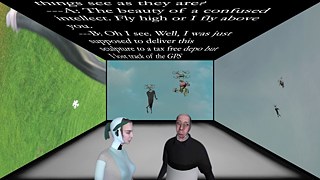Interview with Paul Wiersbinski
On virtual reality and a penchant for the analog

Paul Wiersbinski is the resident artist on the Goethe/SPACE Residency Programme 2018. Before he came over to London we spoke to him about his work.
You are very engaged with questions concerning surveillance. Do you feel that you are being watched?
(Laughs) I don’t think I’m important enough to be under surveillance. At least, I don’t feel like I am. But all of us are of course being observed and we observe one another too. My father comes from the former East Germany and was certainly under tight surveillance and the Stasi had files about him consisting of thousands of pages about when he cleaned the entrance hall and when he argued with my mother. I think it mostly has to do with a feeling of being under surveillance, and not much to do with external factors but rather with how one feels within oneself – unless you are a political activist or live in a totalitarian state, but that doesn’t apply to me.
Your work with virtual reality often has interactive elements. What reactions do you hope to get from the audience?
If you use video glasses you get a very immersive effect. They have recently been used in psychology studies for researching empathy because, interestingly, this very intimate effect creates a connection between two people which is more intense than when people just talk to each other. You think you see your own hand when the other person holds their hand in the image. Although I’m not a scientist, I’d really like to do further work on this. And that’s what I would also like to follow up with the public in the part of London where I’ll be living, and also that aspect of surveillance and virtual reality.
I don’t know in advance what the public will make of this, but it would be boring if I did! Above all I’m excited to find out how the London audience will react to the work. The public there is different to the one in Germany where people are very cautious and critical about this technology. In the English-speaking world people are often more open-minded about it.
Virtuality is an important topic throughout your work. Which do you prefer: the virtual or the analog world?
(Laughs) I’m fairly analog. I don’t have a smartphone, Facebook profile, or other social media but I nevertheless deal with these things in my work. Apart from that I’m confronted with them because all my friends have them. I’m more of a dinosaur. I find the switching between the two worlds particularly exciting and I think you have to be able to swing like a pendulum from one to the other.
Do you have the feeling that not being on social media limits your work? Particularly in London many artists regard having a presence on social media as crucial.
Yes that’s true. It is a limitation not to be present on social media but it’s also limiting to be on it. This way I have time for other things. I have friends even though I’m not on Facebook. So there are simply other things which you can do with your time. However the decision for me to not be on social media was never an ideological one. I never had the feeling that I wanted to use it and therefore I never engaged with it. I already have the feeling that I spend a lot of time hanging around the computer. (Laughs)
Which of your previous works do you like best, and why?
That’s difficult to say. Once I did a project about insects and swarm intelligence. I travelled around a lot, did interviews with researchers, created installations and performances. But I also really like the topic which I’m writing my PhD thesis about – art and computer games. But I wouldn’t say that one work is the best of all. And I also think that has nothing much to do with success. The relationship towards your own work constantly alters.
And what else are you working on at the moment?
I have been nominated for a ‘Kunst am Bau’ (‘art in architecture’) project which is something totally new for me! I have to present an idea and if I’m lucky it will be implemented and stand in front of the Humboldt University in Berlin until the end of my life and beyond. Let’s see! Right now I’m looking forward to London.